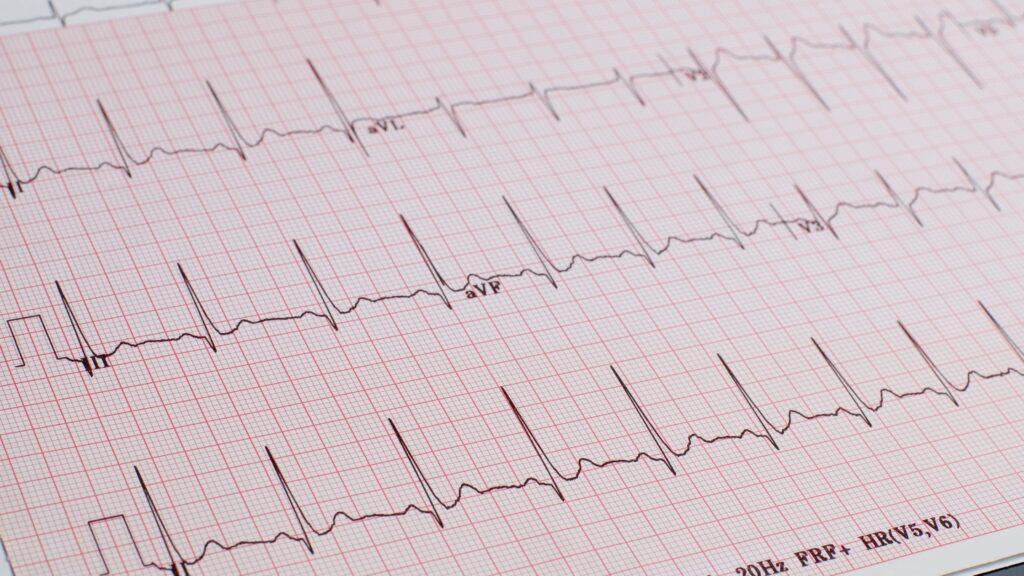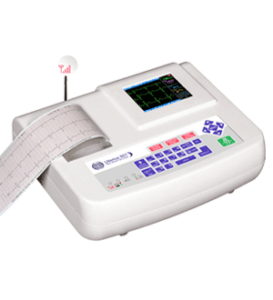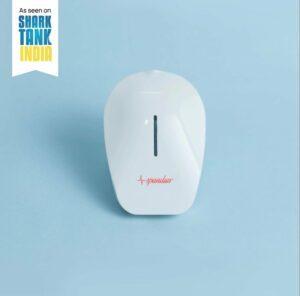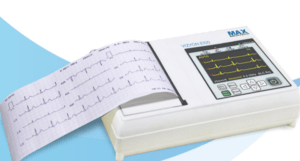The Electrocardiograph (ECG) serves as an indispensable medical instrument utilized to capture and document the heart’s electrical activity. It assumes a critical role in the diagnosis of diverse cardiac conditions by offering valuable information regarding the heart’s rhythm and functionality. By attaching electrodes to specific areas of the body, the ECG machines captures the electrical impulses generated during each heartbeat. These impulses are then amplified and displayed on a graph called an electrocardiogram.
ECG technology plays a crucial role in the medical domain by enabling healthcare providers to detect and diagnose irregularities within the heart’s electrical system. It aids in identifying various conditions, including abnormal heartbeats, heart rhythm disorders, and indications of heart attacks.. This non-invasive procedure aids in early detection, guiding appropriate treatment strategies, and monitoring the effectiveness of interventions.
By understanding the purpose and functionality of an ECG machine, individuals can gain insights into their cardiovascular health. They can learn how the machine records electrical signals, interpret ECG readings, and identify potential cardiac abnormalities. This knowledge empowers individuals to take proactive steps towards maintaining a healthy heart and seek medical attention when necessary.
Exploring the 12-Lead ECG Machine
The 12-Lead ECG machine is a significant advancement in cardiac diagnostics, providing a comprehensive assessment of the heart’s electrical activity. Unlike the standard ECG, which uses only a few leads, the 12-Lead ECG utilizes 12 leads or electrodes strategically placed on the body to capture electrical signals from various angles. Each lead provides unique information about different areas of the heart, enabling healthcare professionals to obtain a more detailed and accurate assessment.
The 12-Lead ECG machine is particularly valuable in diagnosing and monitoring various cardiac conditions, such as arrhythmias, heart attacks, and heart muscle abnormalities. It helps identify specific abnormalities, determine the location of heart damage, and guide treatment decisions. By understanding the significance of each lead and the information it provides, healthcare professionals can interpret 12-Lead ECG readings effectively and deliver targeted interventions.
Staying updated on advancements in 12-Lead ECG technology is crucial for healthcare professionals to provide optimal patient care. Continuous research and development in this field aim to improve accuracy, enhance data analysis algorithms, and streamline the diagnostic process. By keeping abreast of these advancements, healthcare professionals can leverage the full potential of 12-Lead ECG machines to ensure accurate cardiac assessments and deliver superior patient outcomes.
Holter Monitor: Continuous ECG Monitoring
The Holter monitor is a portable and non-invasive device used for continuous ECG monitoring. It allows healthcare professionals to evaluate the heart’s electrical activity over an extended period, typically 24 to 48 hours or longer. Unlike a standard ECG, which provides a snapshot of the heart’s activity at a specific moment, the Holter monitor records data continuously, capturing any irregularities or abnormalities that may occur during daily activities.
The Holter monitor proves highly advantageous for diagnosing and monitoring heart rhythm disorders like atrial fibrillation, ventricular tachycardia, and bradycardia. It facilitates the detection and continuous observation of these conditions.It helps detect transient abnormalities that may go undetected in a standard ECG. By wearing the Holter monitor during regular daily activities, individuals can go about their routines while the device continuously records the heart’s electrical signals
Continuous ECG monitoring with the Holter monitor provides healthcare professionals with a comprehensive overview of the heart’s rhythm and enables accurate diagnoses. It helps identify the frequency and duration of irregular heartbeats, assess the effectiveness of medications or interventions, and tailor treatment plans accordingly. Additionally, the Holter monitor is instrumental in evaluating symptoms that occur infrequently or intermittently, aiding in the diagnosis of elusive cardiac conditions.
With advancements in technology, modern Holter monitors have become more compact, user-friendly, and capable of longer recording periods. They often come with software that facilitates data analysis and interpretation, making it easier for healthcare professionals to extract meaningful information from the recorded ECG data.
Staying informed about the latest developments in Holter monitoring technology allows healthcare professionals to provide optimal care for patients with suspected or known heart rhythm abnormalities. By understanding the benefits and applications of Holter monitoring, healthcare professionals can make accurate diagnoses, tailor treatment plans, and improve patient outcomes.
Portable ECG Machines: On-the-Go Monitoring
Portable ECG machines offer the convenience of real-time heart activity monitoring outside of medical facilities. These compact and lightweight devices enable individuals to track their heart health on the go, providing valuable insights into their cardiovascular well-being. Portable ECG machines typically come in the form of handheld devices or wearable technology that can be easily carried or worn throughout the day.
The portable ECG machine allows individuals to record and analyze their heart’s electrical signals at their convenience. With just a few simple steps, users can obtain an ECG reading anytime, anywhere. This technology is particularly beneficial for individuals with known heart conditions, those at risk of cardiovascular diseases, or athletes monitoring their heart performance during physical activities.
The applications of portable ECG machines extend beyond personal health monitoring. They are increasingly used in remote patient care, allowing healthcare professionals to remotely assess their patients’ heart health and make informed decisions about their treatment plans. These devices also find utility in fitness tracking and ambulatory monitoring, providing valuable data for athletes, fitness enthusiasts, and individuals interested in maintaining an active and healthy lifestyle.
Staying informed about the features and advancements in portable ECG devices is essential for individuals and healthcare professionals alike. With continuous innovations in sensor technology, data analysis algorithms, and wireless connectivity, portable ECG machines are becoming more accurate, user-friendly, and capable of providing comprehensive insights into heart health. By staying updated, individuals can make informed choices when selecting a portable ECG device that suits their needs, and healthcare professionals can leverage the technology to enhance patient care and remote monitoring capabilities.
ECG Machines in Cardiology: Diagnostic Tool
ECG machines are invaluable diagnostic tools in the field of cardiology, aiding in the assessment of heart function and the identification of cardiac abnormalities. These devices provide crucial information that guides treatment decisions and helps monitor the effectiveness of interventions.
In cardiology, ECG machines are used to evaluate the electrical activity of the heart, assess the heart’s rhythm and rate, and identify any conduction abnormalities. By analyzing the ECG readings, healthcare professionals can detect arrhythmias, ischemic changes, structural abnormalities, and other cardiac conditions. This information is vital for diagnosing and managing various heart diseases, such as atrial fibrillation, ventricular tachycardia, or myocardial infarction.
The ECG machine is an essential tool during cardiology consultations, allowing healthcare professionals to quickly and non-invasively gather important diagnostic data. It serves as a primary screening tool to determine the need for further cardiac investigations or to monitor the progression of a known heart condition. ECG machines are also used during cardiac stress tests, where the heart’s response to physical exertion is evaluated.
Staying updated on the latest research and advancements in ECG technology is crucial for healthcare professionals in the field of cardiology. Continuous innovation in ECG technology, such as the development of advanced algorithms and software, enhances the accuracy and diagnostic capabilities of these devices. By leveraging the power of ECG machines as diagnostic tools, healthcare professionals can provide timely and precise care to patients with cardiac conditions.
Unlocking the Advantages of ECG Machines
ECG machines offer numerous advantages in medical practice, making them indispensable tools in the field of cardiology and beyond. Understanding these advantages helps healthcare professionals maximize the benefits of ECG technology and improve patient care.
One of the key advantages of ECG machines is their non-invasive nature. Unlike other cardiac diagnostic procedures, such as angiography or cardiac catheterization, ECGs do not require any invasive measures. By simply attaching electrodes to the skin, healthcare professionals can obtain valuable information about the heart’s electrical activity. This non-invasive approach makes ECGs safe, comfortable, and accessible to a wide range of patients.
ECG machines also provide quick results, allowing healthcare professionals to obtain valuable diagnostic information in a timely manner. Within a matter of minutes, an ECG can be recorded, analyzed, and interpreted, providing insights into the patient’s heart health. This rapid turnaround time is particularly beneficial in emergency situations or when prompt decisions need to be made regarding patient care.
The accuracy of ECG machines is another significant advantage. These devices capture the electrical signals of the heart with high precision, providing detailed information about the heart’s rhythm, rate, and conduction. This accuracy enables healthcare professionals to detect subtle abnormalities, identify specific cardiac conditions, and guide treatment decisions effectively.
ECG machines also play a crucial role in early detection and risk assessment of heart conditions. Regular ECG screenings can help identify cardiac abnormalities in their early stages, even before the onset of symptoms. This early detection allows for timely interventions, lifestyle modifications, and preventive measures to minimize the risk of complications and improve patient outcomes.
Furthermore, ECG machines are invaluable tools for monitoring heart conditions over time. By comparing ECG recordings from different time points, healthcare professionals can assess the effectiveness of treatments, evaluate the progress of the disease, and make necessary adjustments to the patient’s care plan.
Staying informed about the advantages of ECG machines empowers healthcare professionals to harness the full potential of this technology and deliver optimal patient care. By utilizing ECG machines effectively, healthcare providers can enhance diagnosis accuracy, improve treatment outcomes, and promote overall cardiovascular health.
ECG Machines in Research: Innovating Medicine
ECG machines play a crucial role in advancing our understanding of cardiac physiology and the development of innovative treatment approaches through medical research. These devices find extensive application in diverse research settings such as clinical trials, drug development, and scientific studies. They enable the collection of valuable data and generate insights into cardiac health, contributing to ongoing advancements in the field.
In clinical trials, ECG machines are often employed to assess the cardiac safety and efficacy of new drugs or medical interventions. By monitoring the heart’s electrical activity during the trial, researchers can identify any potential adverse effects or changes in cardiac function associated with the intervention. This information is critical for ensuring the safety and effectiveness of new medical treatments.
ECG machines are also used in drug development to evaluate the impact of pharmaceutical compounds on the heart. Researchers can assess the drug’s effects on cardiac parameters such as heart rate, rhythm, and conduction, helping to determine its potential benefits and potential risks. This data aids in optimizing dosages, identifying potential drug interactions, and improving medication safety.
Moreover, scientific studies rely on ECG machines to explore various aspects of cardiac health and physiology. Researchers investigate the relationship between ECG findings and specific cardiac conditions, explore novel markers for risk stratification, and identify new patterns or parameters that can enhance diagnostic accuracy. These studies contribute to the development of new diagnostic criteria, treatment guidelines, and clinical decision-making tools.
Staying informed about the latest research breakthroughs with ECG technology is essential for healthcare professionals and researchers alike. Continuous advancements in ECG technology, such as the integration of artificial intelligence and machine learning algorithms, enhance the capabilities and potential applications of these devices. By staying updated, healthcare professionals can contribute to and benefit from the progress in cardiac research, leading to improved patient care and outcomes.
Ensuring Accuracy: ECG Machine Calibration
Calibration is a critical aspect of maintaining the accuracy and reliability of ECG machines. Proper calibration ensures that the recorded electrical signals are accurately represented, allowing healthcare professionals to make precise diagnoses and informed treatment decisions.
ECG machine calibration involves the adjustment of the device’s internal settings and measurement parameters to match a known standard. This calibration process establishes a reference point against which the recorded signals can be compared, ensuring accurate measurements and reliable interpretations.
The frequency of ECG machine calibration depends on the manufacturer’s guidelines and the specific requirements of the healthcare facility. Generally, calibration should be performed regularly to maintain optimal performance. Routine maintenance schedules, including calibration, are typically established by biomedical engineering departments or equipment manufacturers.
During calibration, healthcare professionals verify the accuracy of voltage measurements, the calibration of the leads, and the integrity of the signal acquisition system. This process involves the use of specialized calibration equipment and techniques to generate known electrical signals and compare them with the readings of the ECG machine.
Regular calibration of ECG machines is essential for several reasons. It helps identify any drift or deviation from the standard measurements, allowing for timely adjustments or repairs. Calibration also ensures consistency and comparability of ECG recordings over time, enabling accurate tracking of changes in cardiac function and facilitating longitudinal assessments.
Healthcare professionals should follow best practices and guidelines provided by the equipment manufacturers to ensure proper calibration. This includes using appropriate calibration tools, adhering to recommended procedures, and documenting the calibration process. By maintaining accurate calibration records, healthcare facilities can demonstrate compliance with quality assurance standards and regulatory requirements.
Cleaning and Maintenance of ECG Machines
Proper cleaning and maintenance of ECG machines are essential to ensure their longevity, performance, and patient safety. Regular cleaning and maintenance routines help prevent equipment malfunctions, reduce the risk of cross-contamination, and maintain accurate and reliable recordings.
Cleaning an ECG machine involves the removal of dirt, debris, and contaminants from the device’s surfaces and components. Healthcare professionals should follow the manufacturer’s guidelines for cleaning agents, disinfectants, and techniques to ensure the effectiveness of the cleaning process without damaging the equipment.
It is important to establish a regular cleaning schedule for ECG machines, especially in healthcare settings where multiple patients are examined. Routine cleaning should be performed between patient use and whenever the device becomes visibly soiled. This practice helps maintain a hygienic environment, prevents the spread of infectious agents, and ensures patient safety.
In addition to cleaning, ECG machines require regular maintenance to address mechanical issues, electrical components, and software updates. Healthcare facilities should establish preventive maintenance schedules based on the manufacturer’s recommendations to detect and address any potential problems proactively.
Proper storage of ECG machines is also essential to maintain their integrity and performance. When not in use, the device should be stored in a clean and dry environment, protected from dust, moisture, and extreme temperatures. This prevents damage to sensitive components and extends the lifespan of the equipment.
Training healthcare professionals on the proper cleaning and maintenance procedures for ECG machines is crucial. They should be educated on the correct use of cleaning agents, disinfection protocols, and equipment care tips. This empowers them to effectively clean and maintain the devices, ensuring their longevity and reliability.
Electrocardiograph Machine (ECG) from Leading Indian Manufacturers
Ulterius 501
Ulterius 501 is an advanced Electrocardiograph Machine (ECG) designed and manufactured by Recorders & Medicare Systems Pvt. Ltd. (RMS India), a leading global supplier renowned for their expertise in ECG technology. With a wide range of EKG machines, RMS offers superior quality and affordable solutions to cater to various healthcare needs.
The Ulterius 501 ECG machine stands out with its exceptional features and versatility. It is equipped with a user-friendly LCD screen, enabling clear and convenient viewing of ECG waveforms and patient data. The inclusion of USB prints and USB storage ensures effortless data transfer and archiving for efficient record keeping.
RMS takes innovation a step further by offering PC-based ECG machines that can be seamlessly integrated with laptops, enabling telecamping capabilities. This functionality allows for remote ECG monitoring, enhancing accessibility and convenience for healthcare professionals and patients alike. All portable and PC-based ECG machines from RMS are fully compatible with RMS Tele Medicine Solution, ensuring seamless integration into telemedicine workflows.
One of the standout features of Ulterius 501 is its online global access, facilitated by wireless patient data transmission. This bi-directional capability allows for the effortless sending and receiving of ECG data from numerous locations. The secure GPRS connection ensures the transmission of vital data with utmost privacy and confidentiality. Furthermore, the SMS notification facility keeps healthcare providers promptly informed of any critical updates.
Efficiency is at the core of Ulterius 501, as it offers a one-touch upload facility for patient data. This streamlined process saves time and simplifies data management for healthcare professionals. Additionally, the machine’s specialist diagnosis report can be easily obtained with a single click download key, providing valuable insights into the patient’s condition.
RMS understands the importance of device compatibility in the modern healthcare landscape. Therefore, Ulterius 501 supports all major wireless devices and platforms, including Android, iOS, Windows, and BlackBerry. This broad compatibility ensures seamless connectivity and accessibility for healthcare providers using different devices and operating systems.
Spandan 4.0 Portable 12-lead ECG device
Introducing Spandan 4.0, the revolutionary portable 12-lead ECG device manufactured by Sunfox Technologies Private Limited in India. This matchbox-sized device, weighing a mere 12 grams, packs a powerful punch in cardiac diagnostics. With an android application at its core, Spandan 4.0 is designed to detect 12 heart dysfunctions and 21 classified arrhythmias with exceptional accuracy and ease of use.
The user-friendly nature of Spandan 4.0 is exemplified by its comprehensive application, which guides users throughout the test process. From correctly placing chest leads to explaining the results, the app ensures a seamless experience for both healthcare professionals and patients. This feature empowers individuals to quickly understand their results and facilitates efficient interpretation by doctors. A staggering success rate of 99.7% reported by hundreds of physicians and cardiologists attests to the device’s reliability.
In addition to its user-friendly interface, Spandan offers a host of convenient features. A summary report is generated on your smartphone, providing a concise overview of your ECG reading. Furthermore, Spandan delivers reliable and swift ECG readings, taking just 10 seconds for basic testing and 90 seconds for advanced testing. This versatility enables Spandan to be utilized in various healthcare settings, including clinics, general practitioners’ offices, and health facilities.
Spandan 4.0 is designed for wide-ranging usage, catering to diverse demographics. Individuals of all walks of life, including the elderly, high-risk individuals, diabetics, people with heart disease, those who have undergone cardiac treatment, individuals undergoing cardiac rehabilitation, and those in post-cardiac surgery recovery, can benefit from its self-monitoring capabilities.
The exceptional features of Spandan 4.0 are further highlighted by its technical specifications. Designed primarily for household use, hospitals, and clinics, the device requires no batteries, internet connectivity, or radiation, ensuring a hassle-free and safe experience. Its 12-lead ECG monitoring and live ECG monitoring capabilities extend beyond the standard 24-hour period, enabling continuous and comprehensive cardiac monitoring.
Generating printable ECG reports on regular A4 size papers, Spandan 4.0 allows for easy record-keeping and sharing of vital information. Its trend analyzing feature and zoom functionality, offering up to 50x magnification of the ECG trace, facilitate in-depth examination and analysis. The device provides unlimited interpreted ECG reports, supporting ongoing monitoring and analysis of cardiac health.
ECG 300G
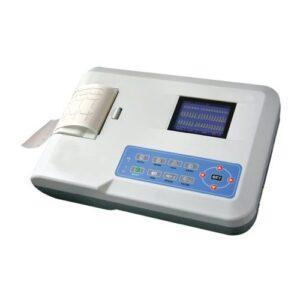 The ECG 300G, manufactured by Silverline Meditech Pvt. Ltd. in India, is a versatile and highly functional electrocardiogram (ECG) machine that caters to a wide range of users, including home users, clinics, hospitals, and telemedicine providers. This portable device offers a comprehensive set of features and capabilities, making it an ideal choice for various applications.
The ECG 300G, manufactured by Silverline Meditech Pvt. Ltd. in India, is a versatile and highly functional electrocardiogram (ECG) machine that caters to a wide range of users, including home users, clinics, hospitals, and telemedicine providers. This portable device offers a comprehensive set of features and capabilities, making it an ideal choice for various applications.
Portability is a key highlight of the ECG 300G, making it suitable for home use. With its lightweight and compact design, the device is easy to carry and can be used conveniently anywhere. It also delivers high-quality digital ECG readings, ensuring accuracy and reliability for clinics and hospitals.
Equipped with 12-lead ECG capabilities and interpretation software, the ECG 300G provides detailed and precise readings of the heart’s electrical activity. This feature makes it highly effective in diagnosing a wide range of heart conditions, including arrhythmias and other cardiac disorders.
The ECG 300G is a wireless device with built-in Bluetooth technology, allowing seamless connection to other Bluetooth-enabled devices such as smartphones, tablets, and laptops. This enables easy data transfer and remote access to the collected information.
Designed as a hospital-grade ECG machine, the ECG 300G offers highly accurate readings that are essential for precise diagnosis and treatment. It also serves as a valuable tool for on-the-go monitoring, providing real-time data to healthcare providers for informed decision-making in patient care.
For remote access, the ECG 300G is a PC-based device that can be connected to a computer, facilitating real-time data transfer and analysis. This feature caters to the needs of telemedicine providers and other healthcare professionals who require remote access to patient data.
With arrhythmia detection capabilities, the ECG 300G provides advanced warning of potentially life-threatening cardiac events. The device also supports stress tests, making it ideal for monitoring patients during exercise and strenuous activities.
In pediatric use, the ECG 300G delivers accurate readings of the heart’s electrical activity for infants and children. It includes a voice recording feature that enables healthcare providers to document notes and additional information about the patient.
Clarity ECG
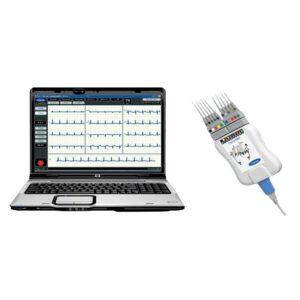 Clarity ECG, manufactured by Clarity Medical Pvt. Ltd., stands out as a leading manufacturer and global supplier of electrocardiograph machines (ECG) in India. ECG machines record the electrical activity of the heart, and the Clarity ECG is a highly portable and power-efficient 12-lead ECG machine. Specifically designed to be used with a laptop or desktop computer, this device operates solely through USB power.
Clarity ECG, manufactured by Clarity Medical Pvt. Ltd., stands out as a leading manufacturer and global supplier of electrocardiograph machines (ECG) in India. ECG machines record the electrical activity of the heart, and the Clarity ECG is a highly portable and power-efficient 12-lead ECG machine. Specifically designed to be used with a laptop or desktop computer, this device operates solely through USB power.
The Clarity ECG offers an innovative desktop/laptop sampling device that excels in performance while boasting an effective graphical user interface (GUI) and appealing aesthetics. It allows for simultaneous acquisition of 12 leads, giving users the ability to configure display windows according to their preferences through an intuitive interface.
When it comes to convenience, the Clarity ECG shines as a lightweight and compact device. Its small size makes it easy to transport and handle, catering to users who require mobility and flexibility in their ECG monitoring needs.
An important feature of the Clarity ECG is its capability to import true ECG data from external sources. This versatility enables seamless integration with other systems or the ability to incorporate data from diverse medical devices for a comprehensive view of a patient’s cardiac health.
One notable advantage of the Clarity ECG is its ability to produce smooth waveforms without pixelization. This ensures the clarity and accuracy of ECG tracings, aiding healthcare professionals in interpreting the data effectively.
The device offers customization options for print pages, providing users with a full preview and various printing formats to suit their specific requirements. This flexibility allows for the generation of high-quality printed ECG reports, facilitating clear communication and documentation of patient information. Furthermore, the Clarity ECG enables the convenient storage of ECG data on a CD, ensuring secure and accessible archiving of patient records.
Accuracy is paramount in ECG analysis, and the Clarity ECG excels in beat detection, as well as marking critical points such as the Isoelectric line, J point, and post-J point. Additionally, the device includes advanced algorithms for result calculation, ensuring precise and reliable diagnostic information.
Vizyon E100
MAX Meditech Pvt. Ltd. (formerly A.B. Industries) is a renowned manufacturer and global supplier of electrocardiograph machines. Their flagship product, the Vizyon E100, stands out for its comprehensive result interpretation and advanced functionalities.
The Vizyon E100 is designed to provide thorough result interpretation based on its wide range of functions. To ensure accurate readings, the device applies filters throughout the entire digital processing process, effectively eliminating primary interference, muscle tremor, and baseline drift. This advanced filtering technology enhances the precision and reliability of the ECG data, enabling healthcare professionals to make informed diagnostic decisions.
Equipped with a user-friendly keypad, the Vizyon E100 offers easy access to all its features. Users can navigate the device effortlessly, allowing for efficient and convenient operation during ECG examinations. This intuitive interface enhances the user experience, streamlining the workflow and ensuring maximum productivity.
The Vizyon E100 incorporates true interpretation sensitivity algorithms, further enhancing its diagnostic capabilities. These algorithms enable the device to analyze ECG data with high sensitivity, accurately detecting and interpreting various cardiac abnormalities and conditions. This ensures reliable and precise diagnostic results, enabling healthcare professionals to provide optimal care to their patients.
For user identification and tracking, the Vizyon E100 offers the option of individual tracking with a username. This feature allows for personalized data management, facilitating easy retrieval and organization of patient records. By assigning specific usernames to each user, healthcare facilities can maintain accurate and secure ECG data for efficient patient monitoring and follow-up.
When it comes to data output, the Vizyon E100 supports a 4-channel printout format. This enables comprehensive analysis and evaluation of ECG traces, providing a more detailed representation of the heart’s electrical activity. The device’s printing capabilities ensure clear and high-resolution printouts, enabling healthcare professionals to effectively review and interpret the ECG data.
In addition to its standalone capabilities, the Vizyon E100 offers PC connectivity options. This feature allows for seamless integration with computer systems, facilitating data transfer and storage. Healthcare facilities can easily connect the device to a computer, enabling efficient management, analysis, and sharing of ECG data. The PC connectivity feature enhances data accessibility and promotes collaborative decision-making among healthcare professionals.
Medzell: Empowering Healthcare through Innovative B2B Platform
Medzell is a revolutionary B2B platform that is at the forefront of promoting Indian medical devices in emerging markets. It serves as a digital marketplace connecting manufacturers, distributors, and healthcare facilities, facilitating the seamless exchange of cutting-edge medical technology.
With a vision to bridge the gap between medical device manufacturers and global healthcare providers, Medzell offers a wide range of Indian medical devices, including ECG machines, to meet the evolving needs of the healthcare industry. The platform showcases high-quality products that adhere to stringent quality standards and regulatory requirements.
One of the key strengths of Medzell is its commitment to innovation. By partnering with leading Indian medical device manufacturers, Medzell brings forth a diverse range of innovative solutions to address various healthcare challenges.
Conclusion
In conclusion, Electrocardiograph (ECG) machines have become crucial instruments in the area of cardiology, revolutionising the diagnosis and surveillance of cardiac problems. ECG equipment has greatly enhanced patient care and results thanks to its non-invasive nature and cutting-edge technology. These devices have made great progress since they first appeared, including the addition of wireless connectivity and portable designs. This advancement has improved patient and healthcare professionals access to ECG equipment and made them easier to use. Future advances that will improve the ECG equipment’ precision, practicality, and price are expected to be positive. We may look forward to a time when ECG machines are still used to save lives and advance everyone’s heart health by continuing to push the boundaries of innovation.
